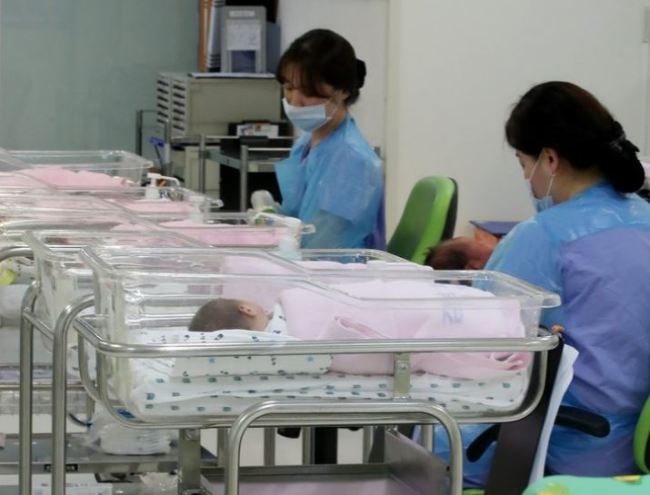SEJONG -- The number of newborns in South Korea dipped again in January, government data showed Wednesday, in the latest sign of the chronic low birthrate that has plagued the Asian country for more than a decade.
About 32,100 babies were born in January, down 8 percent, or 2,800, from 34,900 tallied a year earlier, according to data from Statistics Korea.
Monthly childbirths have decreased on-year every month since December 2015.

Last year, the number of newborns dropped to a new record low despite decadelong efforts to tackle the country's chronically low birthrate.
The number of babies born in 2017 reached 357,700, down 11.9 percent, or 48,500, from a year earlier.
The figure marked the lowest number of newborns since the statistics agency started to compile such data in 1970.
The crude birthrate, referring to the number of live births per 1,000 people, also came to an all-time low of 7 last year, down from the previous year's 7.9.
Also, the total fertility rate, or the number of babies that a woman is projected to have during her lifetime, fell to 1.05 last year from 1.17, also marking a record low, the report showed.
Coupled with a rapidly aging population, a low birthrate can reduce the available workforce in Asia's fourth-largest economy and drive up welfare costs, undermining the growth potential of the economy.
The South Korean government has poured 80 trillion won ($74.5 billion) into dealing with the low birthrate for the past decade, including measures to encourage people to have more children through offering various incentives like cash rewards.
Meanwhile, the number of deaths came to 31,600 in January, up 22 percent, or 5,700, from a year earlier, and the number of marriages came to 24,400 in January, up 2.5 percent, or 600, from a year earlier, the data showed. (Yonhap)









![[Hello India] Hyundai Motor vows to boost 'clean mobility' in India](http://res.heraldm.com/phpwas/restmb_idxmake.php?idx=644&simg=/content/image/2024/04/25/20240425050672_0.jpg&u=)










